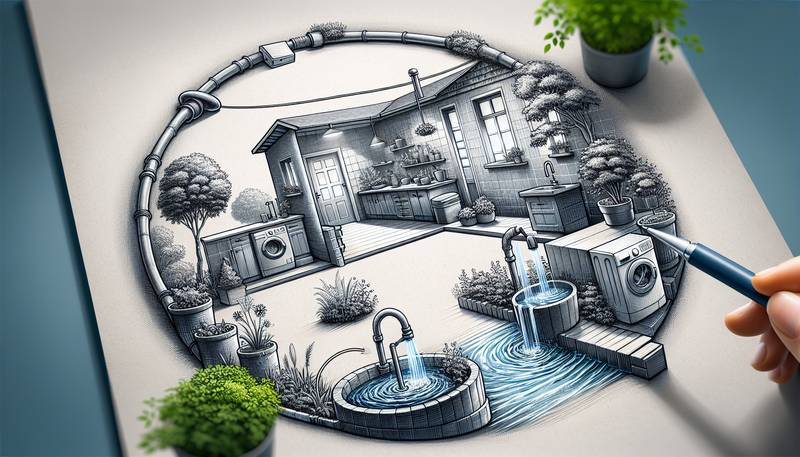Embracing Greywater Systems: Plumbing Solutions for Homes
 Greywater systems are the unsung heroes of sustainable living, quietly working behind the scenes like a well-trained butler who knows when to refill your drink without interrupting your conversation. Picture this: while you’re preparing that five-course meal, the greywater system is working diligently, recycling your used water like a pro, saving the day one flush at a time.
Greywater systems are the unsung heroes of sustainable living, quietly working behind the scenes like a well-trained butler who knows when to refill your drink without interrupting your conversation. Picture this: while you’re preparing that five-course meal, the greywater system is working diligently, recycling your used water like a pro, saving the day one flush at a time. Understanding GreywaterGreywater is that lovely liquid waste that comes from sinks, showers, and washing machines, but not from toilets. Yes, that’s right! Toilets have their own special kind of wastewater party, which we won’t be crashing today. Greywater is perfectly reusable for chores like irrigation and toilet flushing, making it an eco-friendly alternative. Think of it as the water equivalent of taking leftovers and turning them into a tasty new dish. Once a mere thought in the minds of sustainable design aficionados, greywater systems have become increasingly accessible and practical for homeowners. They don't require a PhD in plumbing to install, so don’t worry, you can still call your uncle Bob for help.The Benefits of Greywater SystemsWhy would anyone want to embrace greywater systems? For starters, they provide a myriad of benefits:- Water Conservation: They save gallons of water, which means more time soaking in the bathtub and less time guilt-tripping over your environmental footprint.
- Cost-Effectiveness: By recycling your water, graywater systems can lead to lower utility bills. This means you can finally afford that collection of rubber ducks you’ve been eyeing.
- Garden Love: Plants adore greywater. Imagine your garden flourishing like it just won the lottery. Your flowers will be the envy of the neighborhood.
- Less Strain on Septic Systems: Filtering out greywater reduces the load on your septic system, extending its lifespan. It’s like giving your sewer a spa day!
Embracing greywater systems is like switching from a regular car to a hybrid: you’re saving fuel, reducing emissions, and you get to feel pretty cool about your eco-friendly choice. Not to mention, you’ll become the go-to source for sustainable living advice at your next barbecue.How to Implement a Greywater SystemThe process of installing a greywater system can feel like assembling IKEA furniture: slightly confusing but ultimately rewarding. For those brave enough to tackle this project, here’s what you need to know:1. Check Local Regulations: Before diving in, it’s crucial to ensure compliance with local plumbing codes and regulations. You don’t want to be that person on the news for unapproved plumbing shenanigans.2. Determine Your System Type: There are various options, including simple diverters and more complex treatment systems. Choose one based on your home's needs. If you’re unsure, consult a professional—think of it as hiring a tour guide for your plumbing adventure.3. Plan Your Layout: Position your greywater system strategically in your home. Everything should lead seamlessly to the garden, allowing your plants to bask in the recycled glory.4. Install Your System: Depending on your chosen type, installation can vary from a DIY project to a full-blown renovation. If you’re a DIY enthusiast, don’t forget to wear your tool belt; it’s a proven way of boosting confidence.5. Maintenance and Monitoring: Once your system is up and running, regular maintenance is vital. Check filters, lines, and connections. After all, you wouldn’t want your eco-friendly system to turn into a DIY horror story.Common Myths about Greywater SystemsLet's address some common misconceptions surrounding greywater systems. - Myth 1: Greywater smells bad. Nope! When properly maintained, greywater can be just as fragrant as your neighbor’s garden on a spring afternoon.
- Myth 2: It’s complicated to use. Sure, it can seem a bit complex, but once you adapt, it's as easy as making toast—if your toaster was designed to help the environment.
- Myth 3: Greywater is unsafe. If treated and managed properly, greywater is safe for irrigation. Remember, some of the tastiest fruits and veggies grow in soil that interacts with recycled water—just ask your favorite farmer!
In the end, embracing greywater solutions could mean the difference between a water-wasting household and a home that thrives sustainably. It's time to bid adieu to those guilty feelings while watching water go down the drain. Let the plants drink up and let the savings roll in. After all, saving the planet might just come with a few unexpected perks—like being the favorite neighbor known for both your garden and your questionable collection of rubber ducks!
|
|







